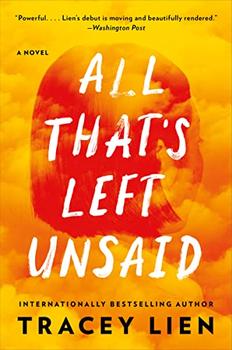Summary | Excerpt | Reviews | Beyond the Book | Readalikes | Genres & Themes | Author Bio

A Novel
by Tracey Lien
Ky didn't immediately listen to any of the voice messages her parents left on her phones. It would be something dumb, because it always was: Denny wanted to go on a school camp—was that safe? Denny wanted to drop physics in year eleven—would he still be able to become a doctor without it? Denny needed to travel for a debating tournament—was that legitimate? Did teenagers lie about these things so they could do drugs instead?
When it came to Denny, who was five years younger than Ky, it was as if her parents had lost the ability to parent, forgotten that they'd done it once before, panicked at the prospect of having to do it again. The Trans clung to the old country and the belief that boys were more valuable than girls. After all, boys carried on the family name and were traditionally the breadwinners. Even the best of girls eventually married and joined someone else's family. Ky also suspected that, with Denny, her family felt they had a fresh start. Denny was born in Australia, after the family had settled in Cabramatta. Ky was their trial-and-error baby, brought from Vietnam, toilet-trained in a Malaysian refugee camp, and sent to English as a Second Language classes from kindergarten through year two. Her parents doubted whether Ky would succeed, feeling she was too much like them. Denny represented an untainted opportunity, one where they wouldn't have to make compromises. Which, she understood, was why they were so precious with him, so unable to make decisions without worrying that they were jeopardizing their only son's future.
Ky had resented Denny when he was first born, but she remembered the moment her heart thawed: Denny, still wearing a nappy, squatted beside a six-year-old Ky as she colored in the flags of all the countries participating in the 1980 Summer Olympics in Moscow. Ky had warned Denny not to touch her colored pencils or to put his sticky fingers on her worksheet. So Denny planted himself beside her, elbows on knees, chubby chin in his hands. He watched her quietly, the scratch of pencil on paper the only sound in the family living room, when all of a sudden she heard the sloppy wet sound of a juicy fart. When Ky whipped her head from her worksheet, Denny's mouth was a circle, his eyes enormous. Before she could accuse him of being a big dumb baby who pooped in his pants, the toddler said, in the same cadence as the people they'd seen in Ajax Spray 'n' Wipe commercials, "Oh no!" And something inside Ky—the walls that she had erected to keep her from liking the baby brother that her parents loved so much more—collapsed. She laughed and laughed, and she couldn't stop, and her stomach muscles hurt from it, and she was gasping for air. And then Denny started rolling on the floor laughing, too, and the rolling made his butt squish into the wet poop, which made the scent radiate from his nappy, which made Ky gag, but she couldn't stop laughing, and she swore it smelled so bad she could taste it, but she couldn't close her mouth because she had to keep laughing.
Back in her Melbourne apartment, after she'd picked up a pizza and a six-pack of Tooheys New because she wanted to train herself to be like her colleagues, who didn't flush beet red after two sips, she played all the voice messages.
In the first three, her father, who spoke to her only in Vietnamese, said to call him back as soon as possible, that this was urgent. In the fourth, he said something had happened to Denny. In the fifth, that Denny had been killed, that they were organizing the funeral, that she had to fly back as soon as possible. His voice never broke; she never heard tears. She rewound the tape, replayed the messages from the start so many times that the words became meaningless. She wondered whether she even understood Vietnamese anymore—whether she was so rusty that she had simply misheard, that by killed, her father actually meant "graduated early because he was that smart, and why couldn't you have been as smart as your little brother?" She considered a scenario where her brother was being bullied at school. Maybe her parents were worried, and she was being called home to stand up for him, to slap or smack his bullies, to demand that the school protect its brightest student.
Excerpted from All That's Left Unsaid by Tracey Lien. Copyright © 2022 by Tracey Lien. Excerpted by permission of William Morrow. All rights reserved. No part of this excerpt may be reproduced or reprinted without permission in writing from the publisher.
It is among the commonplaces of education that we often first cut off the living root and then try to replace its ...
Click Here to find out who said this, as well as discovering other famous literary quotes!
Your guide toexceptional books
BookBrowse seeks out and recommends the best in contemporary fiction and nonfiction—books that not only engage and entertain but also deepen our understanding of ourselves and the world around us.